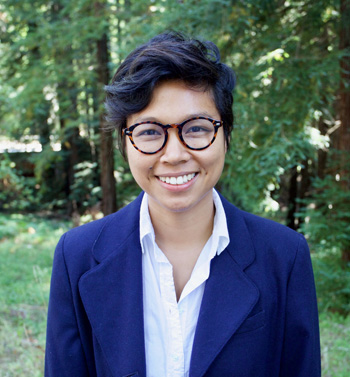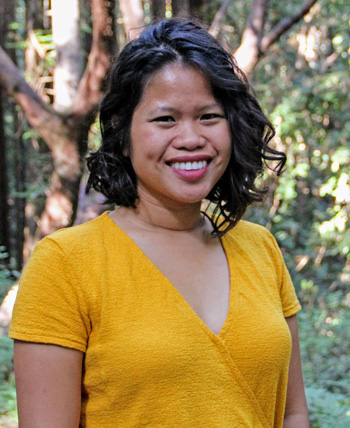Campus News
Two UCSC graduate students win HHMI Gilliam Fellowships for Advanced Study
The Howard Hughes Medical Institute has awarded Gilliam Fellowships for Advanced Study to two UC Santa Cruz graduate students, Apple Cortez Vollmers and Donna Poscablo.


The Howard Hughes Medical Institute (HHMI) has awarded Gilliam Fellowships for Advanced Study to two UC Santa Cruz graduate students, Apple Cortez Vollmers and Donna Poscablo. The Gilliam Fellowship program recognizes exceptional doctoral students who have the potential to be leaders in their fields and the desire to advance diversity and inclusion in the sciences.
Vollmers, who has also received a fellowship from the Ford Foundation, is working with Susan Carpenter, assistant professor of molecular, cell and developmental biology, to study the role of long noncoding RNAs (lncRNAs) in regulating the inflammatory response of the innate immune system. They have identified a lncRNA called GAPLINC as a novel regulator of the immune response and are investigating its biological functions and molecular mechanisms.
“We believe our research can have a broad impact, directing future therapies for sepsis and other inflammation-associated diseases,” Vollmers said.
After studying biology at UC San Diego and working in a research laboratory, Vollmers earned a teaching credential and taught high school mathematics in San Jose for four years before entering the graduate program at UC Santa Cruz. As a teacher at a school with a large population of low-income students, she found that her own background, having grown up in a disadvantaged community after her family immigrated from the Philippines, helped her to identify with and support her students. Vollmers is the first in her family to attend college and pursue a Ph.D. At UCSC, she serves as a mentor for undergraduates and continues to focus on supporting underrepresented students in the sciences.
“My experience as a classroom teacher fuels my need to continue advocating for underrepresented students,” Vollmers said, adding that she is excited to serve as a role model for her former students, five of whom are now undergraduates at UCSC, and she hopes to establish a peer-mentor program for graduate students.
Poscablo is studying age-related changes in platelets and their role in age-associated strokes, working with Camilla Forsberg, professor of biomolecular engineering. They discovered a platelet differentiation pathway activated during aging that results in two distinct populations of platelets in older mice. Poscablo is investigating how this pathway is induced and whether it is related to the abnormalities in platelet regulation that are associated with strokes. She has also received a fellowship from the American Heart Association.
“My long-term goal is to develop therapeutic and preventative strategies for stroke by directly targeting the key regulators of age-specific platelet formation and function,” she said.
Poscablo, whose family moved from the Philippines to Honolulu when she was 8, said education became the primary instrument of change in her life. In high school, her enthusiasm for science led to participation in a research program at the University of Hawaii, where she later enrolled as an undergraduate and became the first in her family to graduate from college. She did summer research projects at UCSF and Albert Einstein College of Medicine, and later did research at UCSF for her master’s degree from San Francisco State University.
While the scientific community has felt like a “second home” to her, Poscablo said she was keenly aware of inequalities in the scientific workforce and the importance of an inclusive environment to attract and cultivate the potential of diverse scientific talent. She aims to support diversity and inclusion in graduate programs at UCSC by empowering graduate students’ voices.
“I have been very fortunate to have mentors along my scientific career to feed me with a simple message—that I belong and my voice is valued,” she said. “My mission is to use all aspects of scientific research as a dynamic mechanism for inclusion and to promote confidence and professional advancement of individuals from diverse cultural and social backgrounds.”
The Gilliam Fellowships for Advanced Study program promotes excellence in the life sciences and related fields by supporting Ph.D. students committed to a career in academic research and faculty and training programs dedicated to developing the talents of promising graduate students from underrepresented groups.